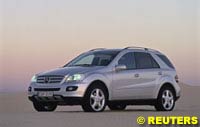

Automotive News and Reviews for the Petrolhead
In this week's issue:
- Car Briefs
- Jaguar Workers Vote Against Strike
- GM Europe Axes 12,000 Jobs
According to a report in the German press, Volkswagen is considering changing the name of the group to Auto Union.
The logic would be that Volkswagen is both a car brand and the name of the holding company that also controls Audi, Bentley, Lamborghini, Seat and Skoda (plus the soon-to-be relaunched Bugatti brand). Auto Union was a famous name in the 1930s and itself was a holding company for four German car manufacturers, including Audi.
Volkswagen is not commenting on the report.
Renault has announced two new special editions for the Clio.
The Extreme 4 is based on the Dynamique, but with prices starting at £8,795 for the 1.2 16V 75 bhp - a £505 reduction. The changes are mostly cosmetic: body coloured bumper inserts, specific blue-grey upholstery and aluminium-finish instrument surrounds. In addition, when bought on Renault finance, buyers will receive free insurance. However the minimum age for free insurance varies according to the engine chosen - from 19 years old on the 1.2 and DCi 65 to 21 years old on the 1.4 and DCi 80/100.
The Rush is based on the Authentique, with a small amount of extra equipment: specific light grey upholstery, 60:40 split folding rear seat and three height adjustable rear headrests. Prices start at £7,995, but there is a £1,200 deposit contribution when bought on Renault finance.
Peugeot has introduced a new version of its Partner van-based MPV. The Partner is basically the same as Citroen's much bigger-selling Berlingo Multispace, which has turned out to be an unexpected success in the UK market. Now Peugeot wants a bigger slice of the action and has brought out the Partner Totem. The Totem is available with either a 75 bhp petrol or a 71 bhp 1.9 litre diesel engine (be aware however, that the 1.9 diesel is not Peugeot's latest high tech oil-burner, but one that dates back to somewhere around the paleolithic era).
Equipment is quite comprehensive: front fog lights, electric windows, central locking, driver and passenger airbag (which can be deactivated to allow the fitment of a child safety seat), electric passenger exterior mirror and CD player. However, air-conditioning is an option.
The Totem is available at a promotional price of £8,300 for the 1.4 petrol version and rising to £8,600 for the 2.0 litre diesel version, until the end of March 2005.
It is clearly designed to be more of a lifestyle vehicle than the previous model. The styling is a lot closer to a big estate car, thanks to a longer, lower bodyshell, which also makes for much improved aerodynamics (the drag co-efficient is reduced from 0.39 to 0.34).
The engine range is mostly new: 2.8 diesel (190 bhp), 3.2 diesel (224 bhp), 3.5 petrol (272 bhp) and 5.0 petrol (306 bhp). Rarely has an engine range so clearly been designed to appeal equally to Europeans and the Americans: the two diesels will make up the vast majority of European sales and the petrols will account for virtually all US sales.
Mercedes managers are promising big improvements in build quality for the new model. Although greatly improved over the lifetime of the first generation M Class, the Mark One was never better than mediocre in this department and some early cars were frankly shocking. Mercedes is now publicly committed to getting back to the quality standards of 10 or 15 years ago.
Workers at Ford's luxury British car unit, Jaguar, have voted against a strike over plans to cut jobs and scale back production, unions say.
About 55 percent of workers overturned a union push to strike over Ford's plans to cut 1,150 jobs at the carmaker as it scales back production. The Amicus and the Transport and General Workers' (T&G) unions said they would continue to campaign against the move.
"The joint unions will keep pushing the company to reconsider their decision and we will continue pushing the government for a change in the law that will help defend UK manufacturing jobs," Amicus national officer Tony Murphy said in a statement on Monday.
The unions said in a joint statement that 555 workers out of about 1,000 voted against strike plans due to fears the company would withdraw generous redundancy packages. The decision paved the way for Jaguar to shift car production from the Browns Lane plant in Coventry to another factory near Birmingham.
"We will continue to consult with union representatives during this difficult period for the Jaguar business and as we move forward with the restructuring proposals announced earlier this year," Jaguar said in a statement.
Jaguar Chief Executive Joe Greenwell said last month the brand would lose hundreds of millions of pounds this year and not break even until 2007 despite the job cuts. Ford bought Jaguar in 1989 for 1.6 billion pounds.
Despite sales growth in Europe and high quality levels, Jaguar has been unable to keep pace with larger rivals in the premium car sector amid a slump in U.S. car sales.
General Motors Europe says it will chop 12,000 jobs over two years -- around a fifth of its workforce -- to lop 500 million euros (350 million pounds) from costs at the loss-making business.
The steps aim to address chronic losses in the region by the world's biggest carmaker, which last made a profit in Europe in 1999 and sees no quick upturn in a market marked by sluggish sales and intense pricing pressure.
"We have an agreement. (German unit Adam) Opel will cut 10,000 jobs in Germany. General Motors will cut 12,000 jobs overall in Europe," a spokesman at GM Europe headquarters in Zurich said. He said GM would try to prevent forced layoffs, but it would only be clear in a few months whether this would be possible.
"We have not decided on any plant closures at this time," he added. "The intent is to avoid plant closures, but there is no guarantee."
A source who attended an Opel works council briefing said the steps would cost GM around $1 billion (690 million pounds) in restructuring charges, but the spokesman would not confirm this number.
In Germany, GM will reduce headcount via state-subsidised "transfer companies" that retrain staff, early retirement, severance packages worth up to 200,000 euros, and finding joint venture partners or buyers for some businesses.
Around 2,500 staff had already agreed to take early retirement offered to those born in 1946 or earlier, Opel said. Fifteen percent of managers in Europe will go in the reshuffle, which stunned Opel's home town of Ruesselsheim.
"If this comes as planned, then the lights are really going to go out here," said one Opel worker who appeared to be around 30 as he emerged from the works council meeting.
"This is really bad for the region. There is a rule of thumb that when one job goes at Opel, then four to five jobs go at suppliers," said the man who did not give his name.
"Transfer companies are just a tactic to delay unemployment," another worker grumbled. "At the end you are just as unemployed. I can only reject it."
German unemployment is already near a seven-year high, with about 4.5 million people out of work in November.
Market Gloom
The cuts are the latest blow to carmaking in western Europe, where manufacturers for the mass market have struggled to boost sales to nervous consumers. Opel's lacklustre brand has also failed to stand out amid increasingly appealing foreign models.
Western European sales of Opel cars, known in Britain under the Vauxhall brand, fell 1.3 percent in the first 10 months of 2004 to 1.12 million, shrinking its market share to 9 percent from 9.3. GM officials who first announced the job cut plans in October called it a case of tough love for a struggling firm.
"Facing the realities of the market is absolutely imperative," GM Europe President Carl-Peter Forster said in a statement. "Over the past three years we worked very hard to find other solutions. Contrary to all forecasts, however, the market has not improved."
Restructuring frees up funds for new model offensives at the Opel/Vauxhall, Saab and Chevrolet brands, he said, noting that 45 new models and variants will launch over the next five years. Klaus Franz, head of both the GM Europe and Opel works councils, said negotiators had got what they could from the talks.
"The works councils' most important goal -- avoiding forced layoffs -- was achieved across Europe. Leaving voluntarily for transfer companies is a far better alternative," he said.
Excess capacity, slack demand and increasing competition from rivals in Asia and low-wage eastern Europe are undercutting prices and fostering U.S.-style incentives that erode profit margins, making labour costs a prime target for savings.
Ford's luxury brand Jaguar is cutting 1,150 jobs, and Fiat is using temporary lay-offs to curb output. In Germany, Mercedes-Benz and Volkswagen) have struck deals to freeze worker pay in return for job security. GM Europe is losing money despite prior cost-cutting drives that reduced capacity in the region by more than a quarter.
It employed around 63,000 people at 11 production and assembly plants in Europe at the end of 2003 and produces around 1.9 million vehicles a year. It has 32,000 workers in Germany. About 2,000 jobs will be cut at GM's plants in Antwerp, Belgium; Zaragoza, Spain; Trollhattan, Sweden; and Ellesmere Port, Britain. Talks there were still going on.
![]() Car Briefs
Car Briefs
 Mercedes has given the first details of the next-generation M Class, which will be introduced in right-hand drive form in Autumn 2005.
Mercedes has given the first details of the next-generation M Class, which will be introduced in right-hand drive form in Autumn 2005.
![]() Jaguar Workers Vote Against Strike
Jaguar Workers Vote Against Strike
![]() GM Europe Axes 12,000 Jobs
GM Europe Axes 12,000 Jobs
| Contact the Editor |
© 2007 autosport.com . This service is provided under the Atlas F1 terms and conditions.
|
Volume 10, Issue 50
The Survivors: 20 Years of Minardi
Interview with Gian Carlo Minardi
The Passion of Stoddart
Making Something out of Nothing
The Minardi Factory Tour
Minardi's Cars Through the Lens
Minardi's Drivers Trading Cards
The Minardi Trivia Quiz
Regular Columns
On the Road
Elsewhere in Racing
The Weekly Grapevine
> Homepage |